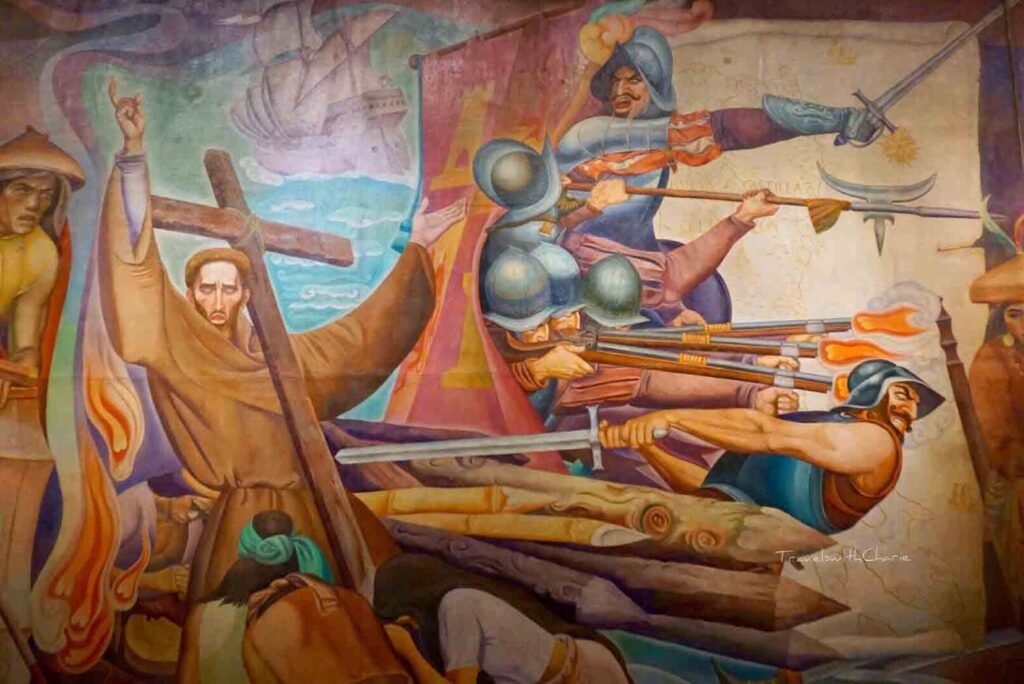
The cross and the sword detail in a Botong Francisco painting.
NEW YORK— Like some capo di tutti capi, in the 15th century, Pope Alexander VI divided the world into two, between the burgeoning Catholic empires of Spain and Portugal. Other imperial contenders such as England and the Netherlands were ignored, due to their not being Catholic—an omission these countries didn’t take kindly to, and would express their disagreement by hounding, harassing, even capturing the ships that carried the flags of these Catholic nations. In essence, these European countries were rival gangs fighting over turf.
Formally established on June 7, 1494, the papal line of demarcation, as it was called, was one hundred leagues west of the Azores and Cape Verde. All lands west of the line were marked for Spain, while those to the east were assigned to Portugal. However, if land in either half was already ruled by a Christian sovereign, it was to be left alone. All else was up for grabs. But Spain and Portugal kept challenging the papal edict, or bull, to suit their respective agendas. The interminable wrangling led to modifications of the original agreement, resulting in the 1506 Treaty of Tordesillas, a small town in northern Spain.
The line was subsequently moved 370 miles west of Cape Verde, approximately right smack in the middle of the Atlantic Ocean. This Vatican-approved line of demarcation, otherwise known as the “Doctrine of Discovery,” provided theological cover for the Spanish and the Portuguese to establish colonial governments through force of arms. Thus, did they claim and profitably exploit in brutal fashion various lands and indigenous populations. Through the conquistadors and the civil and religious personnel that followed in lockstep, Rome extended its reach wherever these two European countries planted their flags—a perfect combination of economic enterprise, worldly power, and religious zeal.
Last week, more than five centuries after its promulgation, the Vatican formally repudiated this doctrine that not only legitimized the seizure of indigenous lands but provided and continues to provide the basis of many property laws in former colonies. Accordingly, the papal documents are said to have been “manipulated” by Spain and Portugal in order to legitimize exploitation and abuses of the indigenous without opposition from local church authorities. In this regard, not only was there little or no opposition from the religious, the latter participated in such abuses, as was true in Las Islas Filipinas. And while the Vatican may have declared that the papal bulls “did not adequately reflect the equal dignity and rights of Indigenous peoples” and have never been considered expressions of the Catholic faith, one wonders why these decrees were issued in the first place.
Admitting its complicity in the historic, worldwide colonial-era abuses by European nations is a welcome, if unduly delayed, step by the Vatican—the result of Pope Francis’s meeting with indigenous tribal heads from Canada a year ago, where the issue was raised. Such demands had been made long before last year’s gathering, including that the Church formally rescind the papal bulls providing the Portuguese and Spanish kingdoms the justification—spreading Christianity—for expanding their territories in Africa, the Americas, and Asia.
This last, according to indigenous leaders, has yet to be done, though they welcome the Vatican’s acknowledgement of having engendered policies that wreaked havoc on subject populations. It is a good first step, but more needs to be done, i.e., asking for forgiveness and making a public show of formally rescinding and rejecting the papal bulls behind the doctrine of discovery.
At its most basic, this dubious claim of “discovery” that has been made repeatedly in colonialist histories—Columbus discovering the New World, Magellan discovering the Philippine archipelago, among other examples—resulted in colossal land grabs. Precolonial concepts of property that emphasized the communal rather than the individual were more often than not simply disregarded by the colonizers. They had the power, a legal system, and the Church’s blessing, inadvertent or not, to do so.
In the case of the Philippines, the friar orders enriched themselves through gaining title to vast tracts of land. By the end of the Spanish colonial era, as the United States was preparing to take over as resident colonizer, friar estates alone totaled 400,000 acres. The US colonial government, through the Philippine Commission, purchased these lands. But instead of reselling, or redistributing, these lands to those who most needed them and thus helping to resolve the land-reform problem long afflicting society, the Commission allowed wealthy elite families and a few corporations to purchase these choice estates.
Today, land reform in the country remains a contentious issue, a major reason for the insurgencies that arose in the last century and that continue to this day, thanks in large part to the disastrous policies of a regressive Roman Catholic Church.
Copyright L.H. Francia 2023

